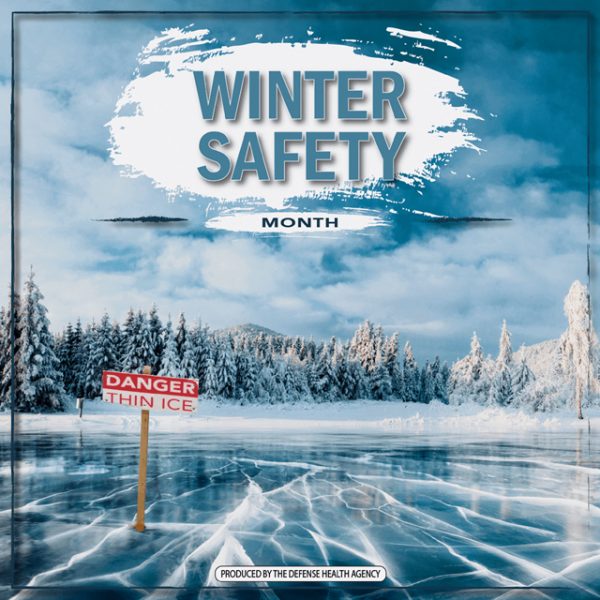
Don’t let seasonal injuries affect your fitness and your readiness to complete your mission. Environmental fitness is a key component of Total Force Fitness. Make sure you are fit, prepared and able to perform required duties even in subzero temperatures, snow and wind. Cold weather, shoveling snow, winter sport injuries, slippery roads and many other winter hazards can put you on the injury report. Make good choices with your exercise and recreation in the winter, and take extra care with regular tasks made more dangerous by ice and snow.
Extreme Cold
Strenuous activity during cold weather can increase your risk of heart attack compared to temperate weather. Cold weather can cause blood vessels and arteries to constrict, making the heart work harder to pump blood. This can cause angina, or chest pain, that can also spread to the shoulders, arms, or neck. Strenuous activity out in the cold should be approached with caution, especially if you are not used to physical activity – this even includes things like shoveling snow, yard work, or exercise.
Preventing cold weather injuries
To prevent cold weather injuries:
- Make good choices about the rigor of your cold weather exercises and the clothing that you wear.
- Take extra care with regular tasks made more dangerous by ice and snow.
- Listen to your body: chest pain, lightheadedness, shortness of breath and dizziness mean that all activity should stop immediately and medical attention is necessary.
Exercising in Cold Weather
Exercising in cold weather poses other different risks than warm or temperate weather. Cold muscles can lead to injuries and your endurance can change.
- Be sure to stretch before exercising in the cold weather.
- Know your winter limits before you push them.
- Wear appropriate gear, or carry gloves, hats, extra socks, or an additional layer.
- Limit time outside in windy, wet, or extremely cold weather.
- Remember, if exertion is keeping your body temperature up, it can drop rapidly once you stop exercising.
Winter sports: Avoiding brain injury
Don’t let seasonal injuries affect your fitness and your readiness to complete your mission. Environmental fitness is a key component of Total Force Fitness. Make sure you are fit, prepared, and able to perform required duties even in subzero temperatures, snow, and wind. Many winter sports, especially high-speed activities like skiing, snowboarding, and skating, carry increased risk of serious Traumatic Brain Injury. Proper use of safety equipment minimizes the risk of serious brain injury.
Staying mission ready means avoiding preventable injury and illness. Winter weather poses a risk to health that can be minimized with proper winter safety actions.
Winter sports like skiing, hockey, and snowboarding are exhilarating, but high speeds carry a risk of injury, including brain injuries.
- Never ski or snowboard alone. Have a buddy who can help in the case of injury.
- Don’t try to perform beyond your ability. Don’t be stuck in the lodge tomorrow because you skied the black diamond today.
- Use the proper safety equipment, especially a well-fitting helmet.
- Dress for the top of the mountain. It’s always colder than the bottom.
- Exercising in cold weather has some different risks than warm or temperate weather. When training in extreme cold, take additional precautions to avoid injuries that can affect readiness.
- Cold muscles can lead to injuries. Make sure you stretch before exercising in the cold.
- Your endurance can change in cold weather. Make sure you know your winter limits before you push them.
- Hypothermia and frostbite are real concerns in extreme cold. Wear appropriate gear, carry gloves and hats, and limit time outside in windy, wet, or extremely cold weather.
- When wintery conditions make roads hazardous, slow down, leave more space between cars, and stay home if you don’t need to be on the road.
- Winterize your car – check tires and battery; replace wiper blades and fluid; ensure antifreeze levels are high; keep your gas tank half-full to prevent frozen lines; and keep extra batteries, flashlights, blankets and a first aid kit in your car.


